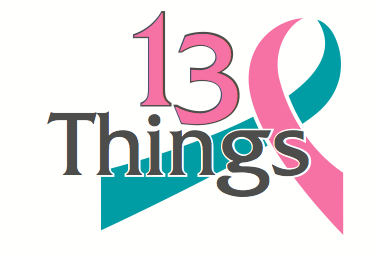Before I was diagnosed with breast cancer at age 33, cancer was not on my radar. Despite the fact that my paternal grandmother had died young of so-called “abdominal cancer,” none of my health care providers indicated that I might be at high risk for cancer. My health care team treated my diagnosis of young-onset breast cancer like a lightning bolt out of the sky. It wasn’t until after my initial treatment (a unilateral mastectomy) that I read a magazine article and learned of several significant red flags for an inherited BRCA mutation. After reading the article I became concerned that my cancer might be hereditary. The article talked about the link between young-onset breast cancer (like mine!) and ovarian cancer (which my grandmother likely had) and BRCA mutations. It also mentioned the relevance of a family’s health history on the paternal side (in my case the only cancer in my family was on my father's side). No doctor had ever expressed interest in the cancer on my father's side of the family. Perhaps the detail that was most surprising to me was the high prevalence of BRCA mutations in people of Eastern European Jewish descent. All of the factors mentioned in the article which raised the suspicion of a mutation applied to my situation. Had I known this information before my mastectomy, I would have pursued genetic counseling and testing and made different surgical decisions at the time of my diagnosis.
Even now, 16 years after my diagnosis, as I give presentations on hereditary cancer, I still frequently meet Jewish people who have no idea of the high prevalence of BRCA mutations in this community. Most Jewish people are aware of the dangers of Tay-Sachs disease, another genetic disorder which is also prevalent in Jewish populations. Yet there are still many people who are Jewish and have a family history of cancer who have never heard of BRCA mutations and are unaware of the availability of genetic counseling and testing. Learning about BRCA almost a year after my initial diagnosis of breast cancer was eye-opening. I learned the importance of people doing their own researching and advocating when it comes to health care decisions.
In keeping with our “13 Things” theme during 2012, I present my list of what Jewish people should know about hereditary breast and ovarian cancer, with the hope that this list will be spread far and wide beyond the FORCE community in order to save lives.
- BRCA mutations have been found in people of every ethnicity. But people of Eastern European Jewish ancestry have the highest known incidence of BRCA mutations, and hereditary breast and ovarian cancer.
- About 1 in 40 people of Jewish decent have a BRCA mutation, about 10-fold higher than other populations.
- Women with a BRCA mutation have up to an 85% lifetime risk for breast cancer and a 50% lifetime risk for ovarian cancer.
- About 40% of Jewish women with ovarian/fallopian tube cancer and 20% who have premenopausal breast cancer have a BRCA mutation.
- BRCA mutations are associated with increased risk for several types of cancer, including breast (both male and female), ovarian, fallopian tube, primary peritoneal, pancreatic, melanoma, and prostate .
- Each child of an affected parent has a 50% chance of inheriting a BRCA mutation.
- BRCA mutations can be passed down equally from fathers or mothers to sons or daughters.
- Beginning at age 40, men with BRCA mutations should discuss with their doctor the benefits, limitations and risks of prostate screening. Preliminary research suggests that prostate cancer in men with a BRCA mutation may be more aggressive than prostate cancer in men who do not have a BRCA mutation. Men with BRCA mutations are at risk for melanoma, male breast and pancreatic cancer as well.
- People who test positive for a BRCA mutation have options to lower their risk for cancer or detect it at an earlier, more treatable stage.
- The majority of BRCA mutations in Jewish people occur in one of three genetic sites. Genetic testing usually begins with a Multisite 3 panel that looks for these common mutations and is less expensive than full BRCA testing.
- In couples where both individuals have a BRCA2 mutation, it is possible for children to inherit a rare and deadly disease known as Fanconi Anemia, which is more common in people of Jewish descent. Couples concerned about this possibility should consult with a genetics expert.
- Genetic testing for BRCA is performed from a blood sample or cheek swab. The test itself is simple, but it is not always straightforward. Consulting with a genetic counselor is the best way to assure the correct test is ordered, results are properly interpreted and an appropriate course of action is discussed.
- The majority of people who have a BRCA mutation or a family history of cancer are unaware of their increased risk for hereditary cancer. Awareness is critical to saving lives.

